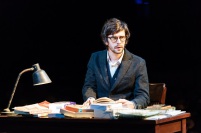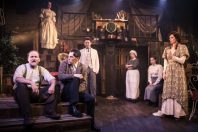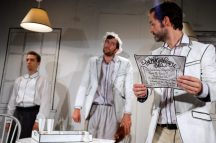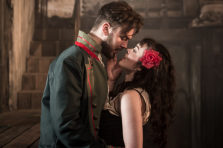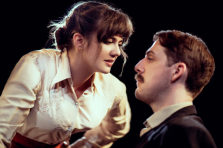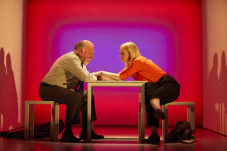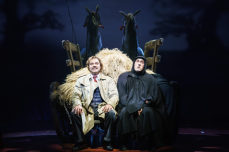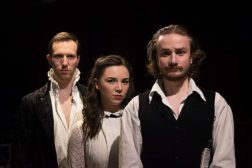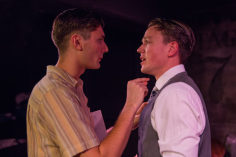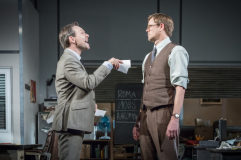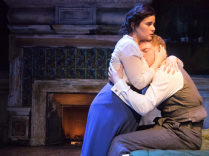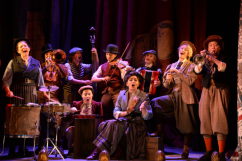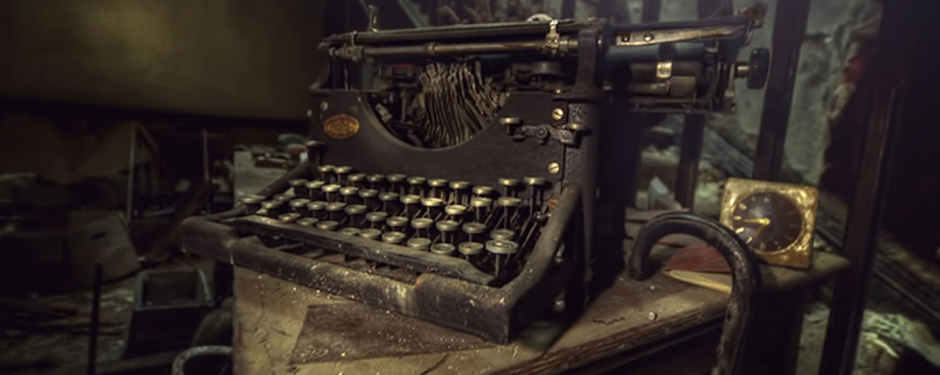
JOE EVANS started reviewing (writing under his full name: Jonathan Evans) for the acclaimed theatre website "Spy In The Stalls" in September 2017 and has since had the privilege of covering many shows, both on the fringe and in the West End.
VISIT THE WEBSITE by clicking on thespyinthestalls logo.
Scroll down for a selection of reviews. For full collection please visit the blog site (under construction... coming soon).
JULIUS CAESAR
Bridge Theatre
Reviewed 30th January 2018
★★★★★
Never has Shakespeare been told with such clarity and disquieting immediacy. An onslaught from start to finish, it begins at a pop-up, raucous rock gig – a scratch band rallying the mob in the pit. This is the first of many pointers as to why the text is still so relevant today. The crowd are cajoled into cheering for Caesar, without knowing why or what he stands for. It is the story of mass emotions and how easily this can rise to civil war. We are shown, in Nicholas Hytner’s spell-binding production, some disastrous home truths about the nature of men and politics: “Julius Caesar” is a timeless mirror in which the present age can see itself.
Hytner’s decision to play it two hours straight through is inspired and adds to the immediacy. Configured in the round, Bunny Christie’s ingenious set rises up from the ground in differing configurations, forcing the crowd to sway with the tide and be bustled into all corners of the space. You can, of course, choose to sit if you wish, but the experience is amplified, both literally and figuratively, by being among the populace on the ground. When Caesar is assassinated we are forced to crouch to the ground by the gun-wielding conspirators. David Calder’s charisma as Caesar prevents us from saluting this slaughter, though his spot-on portrayal of a man too confident of his own power adds diffidence to our reaction.
Ben Whishaw is a revelation as a twitchy, studious Brutus, unsure of himself yet in command. At close range his facial tics and darting eyes convey his uncertainty in his own reasoning. Everything boils down to terminology, and we almost go along with him when he states that “we shall be called purgers, not murderers”, a hauntingly dangerous and resonant frame of mind to be duped into in today’s world.
Opposite Whishaw, Michelle Fairley’s portrayal of Cassius is impassioned and calculating, but does she ever truly get Brutus on her side? The sheer chemistry between the two comes into the open, particularly in the later scenes as they furiously quarrel then make up.
While the conspirators falter, Mark Anthony sets the seal on their destruction. David Morrissey captures, with diabolical precision, his ability to play the emotions of the crowd. His depiction, along with the entire cast, grips the audience and unflinchingly reminds us that political unrest is a beast that cannot, and must not, be ignored. This production is exciting beyond compare; chilling and entertaining in equal measure. And with the aid of Paul Arditti’s sound design and Bruno Poet’s lighting, it resembles at times a filmic, stylish thriller.
It is an absolute must see. Unfloundering to the end, the last line belongs to Octavius, and RADA graduate Kit Young’s (a talent to watch out for) manic smile of jubilation is a sore reminder that history is still on its inevitable and tragic cycle of repeating itself. “How many ages hence, Shall this our lofty scene be acted over, In states unborn and accents yet unknown!”
Photograph by Manual Harlan
HEARTBREAK HOUSE
Union Theatre
Reviewed 9th January 2018
★★★★
It is hard to believe that ‘Heartbreak House’ was written almost a century ago. First performed in 1920 on the English stage, George Bernard Shaw’s text is permanently relevant, which is what makes it a ‘classic’. It is just as entertaining and pertinent as we approach the ‘twenties’ of the new millennium.
This pitch-black comedy is the first of the Union Theatre’s 2018 Essential Classics series, presented by the Phil Willmott Company, dedicated to topical productions in which issues tackled by great playwrights and composers of the past reflect on today’s world. George Bernard Shaw subtitled his work ‘A Fantasia in the Russian Manner on English Themes’. Ostensibly he is paying homage to Chekhov, though there are more nods towards Wilde or Ibsen here. Yet, in my mind, it surpasses both with its intrinsic sense of danger, intrigue and fascination.
From the outset we realise we are in for something special. Justin Williams’ and Jonny Rust’s set is a masterpiece in its own right. As a result, expectations are indeed raised, though it is safe to say that, under Phil Willmott’s direction, they are well and truly sustained throughout. This is a master class in casting: without exception, each actor has total command over the text. They handle the rhythm of Shaw’s dialogue with the skill of virtuoso musicians.
Hesione Hushabye is gathering the outrageously eccentric family of Captain Shotover together in their country house to save her young protégé, Ellie Dunn, from a marriage of convenience to an ageing industrialist. But the bride to be is not as naïve as she appears. In fact, all the characters are not quite what they seem. A heartbroken adolescent can instantly become a cynic on the prowl, a maternal confidante can also be a seductive hostess and emasculating wife, a philanderer can become a hero. These turns and twists of character are what keep us on our toes. James Horne, as Captain Shotover, gives a star performance, appearing at first to live without rhyme or reason, yet behind his ‘Spike Milligan’ eyes he manages to convince us that he is all too aware of what is going on under his roof. Helen Anker’s Hesione utterly bewitches as the witchy lady of the house, a stark contrast to her estranged sister, Lady Utterwood, a high-society prig played by Francesca Burgoyne who deliciously delivers her put downs with a lacerating wit.
It seems unfair, though space dictates it, to single out individual cast members. The entire troupe deserves a mention. This is that rare piece of theatre where, during the whole two hours, not once does one think that we are watching actors playing their part on a stage. They are the characters. And one really does care for them. Behind the razor sharp wit, the biting aphorisms and the cynicism, it is clear that each character does have a heart. This is testament to the performances, not just to the writing. The audience inhabits their world, albeit a world drifting towards disaster.
Shaw depicts a cultured leisured Europe before the war; the deceptions and meaningless pursuits of England's ruling class, and the divide between rich and poor. Throw in the talk and fear of pending war – it might have easily been written about today’s world: “Is this England or a mad house?” asks one of the characters. Yes – there is an underlying message, even a warning, that George Bernard Shaw is drumming home. But he was acutely aware of the notion that the best way to get your message across is to entertain.
And, boy, are we entertained.
If this is a taste of what is to come throughout the season at the Union we are in for a treat.
Photograph by Scott Rylander
THE TOXIC AVENGER
Arts Theatre
Reviewed 2nd october 2017
★★★★★
There is the current argument that the West End has become a very safe artistic world; homogenised and unchallenging, with an eye too much on box office sales. A mirror to the world at large, maybe, that is increasingly fearful of saying the wrong thing or offending the wrong person. Whether one agrees with this or not is irrelevant. All I know is that ‘The Toxic Avenger’ has ripped through this fabric of conventionalism and swept into town like an intoxicating breath of fresh air.
On paper it is such a bizarre, off-the-wall idea. One, I suspect, that would not get through the door of a producer’s office. But Katy Lipson, of Aria Entertainment, has the visionary nerve to grab this beast by the horns and bring it, via Edinburgh and its successful run in Southwark last year, to the Arts Theatre West End. And boy does she do it with gusto!
Based on the 1984 cult film of the same name, with book by Joe DiPietro and music by Bon Jovi band member David Bryan, it is a kind of Incredible Hulk meets Frank-N-Furter musical romp. A story with its tongue literally bursting through its cheek, charting the journey of the eponymous, self-doubting super-hero intent on trying to ‘get the girl’ while simultaneously saving the city from the threat of an evil town mayor. A familiar sounding spoof, but what elevates this musical to the status of masterpiece is its sheer irreverence, daring and unrestrained sense of fun. It is fearless and anarchic and a delightful rebuff to political correctness.
Mark Anderson plays the nerdy Melvin who mutates into the avenging ‘Toxie’, deftly capturing the mix of vulnerability in the former and confused self-righteousness of the monster-on-a-mission in the latter. A devil with the voice of an angel; the entire audience fell for him. On his quest to save the world he enlists the help of blind librarian Sarah, the love of his life (played by Emma Salvo with brilliant comic timing). With her help he very quickly discovers that the town mayor is the ‘bad guy’ (or bad girl in this case), portrayed by Natalie Hope with delicious villainy, yet overflowing with sex appeal. Interestingly she doubles as the hero’s mother – which is used to great comic effect later in the show. But hats off to the two other cast members, Ché Francis and Oscar Conlon-Morrey, who play all the other characters with such dizzying versatility and humour you forget to wonder at how they manage their countless costume changes. Both recent graduates, these are two names to look out for.
I could reel off the highlights of this show but I would be in danger of merely relating the whole story. However the star is the score. Never has pastiche been so expertly delivered. Part of the fun of watching the performance was spotting the myriad musical references, yet the songs still retain an individuality and infectious freshness, with a searing sound from just a four piece band led by musical director Alex Beetschen.
This show is proof that the craziest ideas can yield the best results. It is a show that, from start to finish, never dips. In the opening number the audience are jokingly warned that the performance is eighteen hours long. The irony of this remark is that I really would not have minded if that were true. This is one of those rare productions I could see again and again. I left the theatre with a smile a mile wide. An absolute ‘must see’!
Photograph by Irina Chira
THE DIARY OF A NOBODY
The King's Head Theatre
Reviewed 2nd November 2017
★★★★
Everybody has heard of, if not actually read, the Victorian comic novel, “The Diary of a Nobody”. Like many a classic that has stood the test of time it was a slow burner, but managed to transcend its initial tepid reception, eventually being heralded by Evelyn Waugh as “the funniest book in the world”. Such an accolade is debatable, yet, along with the seemingly pedestrian subject matter of the novel, it is a brave choice to adapt it for the stage in the twenty-first century. ‘Rough Haired Pointer’ admirably pulls this off with this second outing of the piece at the King’s Head Theatre. What the inventive theatre company does extraordinarily well is retain the essence of the novel and its period, while seamlessly shaping it with their own personalities. The resulting mix of self-deprecation and irreverence yields a rich contemporary feel; a kind of satire of a satire.
The diaries center around the fictional author, Charles Pooter, a man of modest ambitions, content with his humdrum life. Yet he is constantly troubled by disagreeable tradesmen, impertinent young office clerks and wayward friends, not to mention his devil-may-care son Lupin with his unsuitable choice of bride. Jake Curran captures the bumbling, absurd, yet ultimately endearing character of Pooter perfectly. Pages of the original text are condensed into a ‘blink-and-you-miss-it’ facial expression or a perfectly timed pause, conveying the underlying astonishment at his own banality.
Mary Franklin, who directs, clearly has an eye for casting. All four of the all-male troupe are excellent in their roles, often taking on multiple personalities. Interestingly, this idea was accidental: the loss of the sole actress due to an emergency after the opening night left the original production with an all-male cast performing all the characters. I don’t know if these four actors were in the original show, but onstage they betray a longstanding camaraderie that is a joy to watch. There is a raw Python-esque quality – with an infectious sense of fun. Jordan Mallory-Skinner plays Pooter’s long-suffering wife with a deadpan quality that illustrates her irritation to her husband to great effect, there is a touch of the young Michael Palin about Loz Keystones’ Lupin and Geordie Wright’s versatility is a roller coaster ride of multiple roles.
Christopher Hone’s ingenious design is almost like a fifth character in the show. Based on the original black and white illustrations from the diaries, the set and costume add surrealism to the action, giving license for the cast to drift into the realms of cartoon, sometimes becoming part of the set themselves, and sometimes stepping out of the set to break the fourth wall.
Like the set, the show does have the overall feel of a sketch however. This is perhaps my only reservation, in that it could benefit from being condensed. But it is a very minor quibble. What sets this show apart from many contemporary comedies is the self-effacing knowledge that it is all just play acting, and the performers embrace this with a great spirit of mischief. They are clearly having a ball. And so are the audience.
Despite being spun just a little too thin, this show is pure gold.
Photograph - uncredited
CARMEN 1808
Union Theatre
Reviewed 13th February 2018
★★★★★
Under the railway arches in Southwark, across the river from the Royal Opera House where “Carmen” is currently running, a very different take on the famous story is taking place. This is the second of the Union Theatre’s 2018 Essential Classics series, presented by the Phil Willmott Company. “Carmen 1808” draws more from the original novella by Prosper Mérimée, yet retains the inimitable tunes from Bizet’s score. A further dimension is added by transposing the narrative into the Peninsular War and the Spanish uprisings against Napoleon.
The starting point is Goya’s painting, ‘The Third of May 1808’, and it is the artist’s vision of the horrors of war that pervades the evening. The starting point is also Goya himself who, as protagonist, watches, paints and comments on the action that leads to the horrifying climax that becomes his canvas. It is a device that is inspired, inventive and ingenious in equal measure.
Condensed into one act running at just over ninety minutes it is an extremely accessible production. There are no pretensions, nor grandiose rhetoric here; it is Musical Theatre. But it is Musical Theatre at its best. Once one has adjusted to hearing different words to the well-known arias, one can savour the flair of Willmott’s lyricism and Teddy Clements’ musical arrangements. The piano is the only prop, but with Clements at the keys and his musical direction of a uniformly strong cast it sounds symphonic at times.
Carmen is a gypsy freedom fighter, adept at seducing low-ranking enemy soldiers to learn military secrets and relaying them to the Resistance. Rachel Lea-Gray gets the mix of earthy pragmatism and fiery seductiveness down to a tee. She plays with the emotions of Captain Verlarde (Maximilian Marston) and Corporal Luis (Thomas Mitchells), two Spanish military commanders battling for her affections. That these two characters represent the original story’s glamorous matador, Escamillo and naïve soldier, Don José respectively is unimportant. The story has the strength to stand by itself. In fact, this staging is perhaps even more appealing to those coming to it fresh, without any knowledge of Bizet’s opera.
Carmen holds court over a group of Spanish resistance fighters, led by Blair Gibson’s scholarly Javier. With a seventeen strong cast the Union’s space is in danger of becoming cluttered, but Adam Haigh’s choreography is as tight as clockwork. Up close the effect is compelling. The pace hits the right tempo throughout as the music weaves between the dialogue. There are a couple of rare, clunky colloquialisms that pop up in the text, but these are swiftly forgotten and they do not succeed in tripping up the flow of the action. Each performer drives their character with a white-knuckled commitment that draws us in and along for the ride.
And so it ends with the painting too. It gives nothing of the story away to reveal that the final scene is a near perfect tableau of Goya’s artwork. The final line is given to Alexander Barria’s Goya himself as he steps out of the action and looks at his creation. What he has witnessed, he reveals, is the trigger for his descent into madness and despair. Not so for the audience, however. Despite the grim epigraph, the dynamism of the cast leaves us in a truly upbeat frame of mind.
Goya’s “The Third of May 1808” has been described by art historians as possibly “the first great picture which can be called revolutionary in every sense of the word, in style, in subject, and in intention”. Although it would be perhaps too grand to describe this interpretation with equal fervour, it is unquestionably – in style, in subject, and intention – a revelation, if not quite revolutionary. This is a show for everyone, and I urge everyone to see it, before the run ends. Although I’m sure that won’t be the end of the road. This musical has to either extend or transfer to a larger space.
Photograph by Scott Rylander
THE DAUGHTER-IN-LAW
ARCOLA Theatre
Reviewed 28TH MAY 2018
★★★★
Written in 1913, D. H. Lawrence never saw his play, “The Daughter-In-Law”, produced during his lifetime. It wasn’t until 1967 that his depiction of marital warfare between a pit worker and his wife had its premiere at the Royal Court. Since then it has been hailed as one of the great British dramas of the twentieth century. What is more surprising than the late recognition for the play, however, is the level of praise awarded to it. Lawrence himself described it as “neither a tragedy nor a comedy – just ordinary”.
Whether or not you agree with his self-deprecatory critique, the script does come with a built-in style that may not appeal to many theatre goers today. Jack Gamble makes no concessions to the modern audience in his production at the Arcola, which is to be applauded. He tells it like it is, with straight forward, intelligent and faithful direction.
Set in a Nottinghamshire coal-mining village its central theme is the conflict between a mother and her daughter-in-law. Mrs Gascoyne (Veronica Roberts) rules over her two sons, Joe (Matthew Biddulph) and Luther (Harry Hepple), the latter newly married to Minnie. Despite a fondness for platitudes such as “a son is a son till he takes him a wife”, it is clear that Roberts’ matriarchal figure has no intention of cutting the apron strings. Tensions are raised, then fall again, as the dialogue chips away at the concurrent issues of class, money and the impending national coal strike.
While it seems that the subject is in danger of being overmined, it is the entrance of Minnie that kick starts the play. Ellie Nunn immediately lets us know that Minnie is a ‘shrew’ unwilling to be tamed. Moreover, her hopes for marriage are not being met by Luther. But Nunn’s moving performance, reinforced by Hepple’s multi-layered portrayal of Luther, convinces us that, despite being at each other’s throats, this could be a loving marriage but for the overshadowing figure of the mother.
Initially the performances are a little too mannered, but with the benefit of the knowledge of what is to come it is now clear that this is a deliberate contrast to the explosive final scenes. Dinah Mullen’s sound design mirrors this with the crescendo of the violent confrontations of the coal-strike outside the house, while Geoff Hense’s shadowy lighting design captures the mood of lives losing focus in a haze of coal dust.
Where it sometimes lacks D. H. Lawrence’s sense of sexual passion, this is a show fuelled by finely chiselled performances. It might appear dated at times with dialogue that grates against contemporary sensibilities, but it is a piece firmly of its time and place. And therein lies its beauty: a snapshot of a bygone era – ‘kitchen sink drama’ before the phrase was coined. The cast’s command of the dialect, coupled with their grasp of the complexities of the characters, lift it above being a mere period drama, making the ordinary extraordinary.
Photograph by Idil Sukan
LADY WINDERMERE'S FAN
Vaudeville Theatre
Reviewed 23rd January 2018
★★★★
By the end of the nineteenth century London publishing houses were awash with “fanologies”: more for the benefit of men on a quest to understand the ladies’ use of the fan and its coded language to convey messages. Combined with eye movements it was a fancy communication tool. The messages conveyed on the whole were those of love. It is no surprise then that it made its way into the title of Oscar Wilde’s 1890s comedy. Whilst its symbolic meaning may be partly lost on a modern audience, the central metaphors still ring true in Dominic Dromgoole’s revival of “Lady Windermere’s Fan” as part of the year long Oscar Wilde season at the Vaudeville.
Young, rich and happily married, Lady Windermere seemingly has it all. Until her husband invites a mysterious widow to her ‘coming of age’ birthday ball. Suddenly everything that she holds dear is in jeopardy. Mixing the comic and the serious, this dramatic technique makes it more interesting, and more full of intrigue, than Wilde’s later, more popular plays.
At the heart of this production are two of Britain’s female comic icons. Kathy Burke, who directs and who has gathered a top notch cast, and Jennifer Saunders who plays the gossip-mongering battleaxe Duchess of Berwick. To allay accusations of star casting, Saunders gives is generous performance and consciously refuses to steal the show (her character is gone by the end of the first act anyway). Yes, there are shades of “Ab Fab”, particularly in the way the character treats her daughter, but Saunders adds more depth here and ingeniously manages to make Wilde’s chiselled epigrams her own.
Grace Molony makes her West End debut as the eponymous Lady Windermere, and she is ‘looking at the stars’. A cool player, she commands the stage. Initially icy in her belief in moral absolutes, she is shaken by a sudden failure in trust caused by the Duchess maliciously yet deliciously leading her into thinking that her husband is having an affair with another woman; a Mrs Erlynne, played by Samantha Spiro giving a glorious and dazzling portrayal of perhaps the most multi-layered character in the piece. All the other characters act as though Mrs Erlynne should be ashamed of herself, yet Spiro plays her without shame. That her character feels so up to date is down to the fact that Wilde was writing before his time. He had the utmost respect for women. Spiro captures this quintessence, but then adds some. Her observations on how easily love can be capsized are heartfelt because she has the biggest heart of them all.
Despite all the right ingredients, though, the production does tread safe ground, but in doing so pays homage to the text, which is the real star of the show. Burke’s solid direction moves the piece along at a comfortable pace, unhindered by Paul Wills uncluttered but strikingly stylised set. Except for a slightly odd musical interlude which, despite being a sharp-witted music hall pastiche penned by Burke herself, is out of place and too obvious a time-filler.
The energy does step up a notch in the second act and the chemistry between the characters strengthens. The scene where Mrs Erlynne persuades Lady Windermere to return to her husband is the highlight of the evening, and the heart of Wilde’s writing comes to the fore. Beneath the wit and the satire, it is what goes unsaid that matters most. This is perhaps Wilde’s play most overflowing with aphorisms, but between the lines, it is the play with the most compassion.
It attacks the un-navigable quagmire of the morals we are supposed to live by, but it does it with heart and humour.
Photograph by Marc Brenner
QUIZ
Noel Coward Theatre
Reviewed 11th April 2018
★★★★
Performance and presentation has become such a prominent part of public life now, that reality has become subjective. ‘Constructed reality’, as a phrase, is relatively new and didn’t exist at the time of the scandal of the “coughing major”, the events of which form the backbone to James Graham’s newest West End play, “Quiz”. But even though the phrase had yet to be coined, the trial of Charles and Diana Ingram accused of cheating on ITV’s ‘Who Wants to Be a Millionaire?’ was still described by those who were there as ‘pure theatre’.
Graham’s stunning play truly reflects this. It is a whirlwind account of the drama that unfolded in both the courtrooms and the television studios, brilliantly highlighting the fact that the two are becoming more and more indistinguishable. The production, directed by Daniel Evans, is inspired and ingeniously constructed, using knockabout comedy to pinpoint the harsh truths of the false world we find ourselves living in. Robert Jones’ set combines the courtroom and the game show as cleverly as Graham’s writing, and even the audience are given a handheld device to pass judgement on the accused. It’s 50:50 – guilty or not guilty. As simple as that.
Although it isn’t quite so simple. We get to decide twice: at interval and at the very end, and each time the verdict is different. The first act concentrates on the prosecution while the second act presents the same set of events from a different camera angle, inviting – or perhaps cajoling – us into rooting for the Ingrams. It is a disquietingly manipulative device, but we accept it.
The multi-tasking cast feast on their roles, relishing the vibrant array of characters they are depicting; from QC to Quizmaster (Keir Charles, for one, hilariously and perfectly capturing the tones and mannerisms of Chris Tarrant); contestant to conspirator, police officer to army general, among many others. We are also given a potted history of light entertainment, and how ‘Who Wants to Be a Millionaire?’, in particular, morphed into a global phenomenon. Far from being expositional it is all quite eye-opening.
But the focal point is the question mark that hangs over Charles Ingram winning the million-pound jackpot. We all know the historical reality of the guilty verdict but Gavin Spokes, as Charles Ingram, has to make us believe in him. And the beauty of his performance allows us to do just that. Assisted by Sarah Woodward’s impassioned defence lawyer, we are driven to reject the reality and overturn the judgement. We are asked to choose a “more entertaining lie over a less extraordinary truth”.
But all the time we are reminded that this is theatre. As thought provoking as it is, it is utterly entertaining, insightful and immersive. It is a compelling presentation, full of sleight of hand that is often as manipulative as the subject matter itself, constantly toying with our perceptions of truth. But amid the mire of differing perspectives, one verdict is absolutely clear – “Quiz” is a sure-fire hit.
Photograph by Johan Persson
HEISENBERG: THE UNCERTAINTY PRINCIPLE
Wyndham's Theatre
Reviewed 10th October 2017
★★★★
It started with a kiss. A seemingly random kiss but for the characters in this two-hander, it changes everything. Forever, At the outset of the play, Alex (Kenneth Cranham) and Georgie (Anne-Marie Duff) are at a certain point in their lives where they believe they control the way they live.
Alex is sitting in St Pancras station like he has so many times before. But this time an American woman comes up and kisses him on the back of the neck. Why? The following ninety minutes explores this with delicious unpredictability, enforcing the notion that we can never really know what will happen next. The show’s title references German physicist Werner Heisenberg’s scientific principle. Without fully understanding the details it seems fashioned around the reasoning that ‘vagueness’ is built into nature.
The content of the play is actually much more simple than this suggests. It is primarily a love story – at its heart the outstanding performances of Cranham and Duff as the odd couple. They are poles apart but their shared experiences of loss and need for healing make them inseparable. Initially Duff’s volatile Georgie comes across as the stronger of the two characters, yet the silent strength of Cranham’s Alex quickly subverts the pecking order. His suspicious mind refuses to let the wool be pulled over his eyes and this gives him the upper hand. He simultaneously censures Georgie’s unscrupulous motives while bowing to them – with dignity. He gives her what she wants, but only in so far as it is what he wants as well.
They both handle the dialogue expertly. Simon Stephen’s text present potential clichés but then turns them on their head giving us a whole new way of looking at the unpredictability of relationships – and in particular Georgie’s dubious relationship with truth. The mood can turn on a knife edge and sympathies switch with alarming speed. The emotions grow and shrink within Bunny Christie’s ingenious set of shifting walls. But the strongest moments are the more reflective passages, touching on age, tenderness, loss and loneliness. Kenneth Cranham has a glorious monologue, underscored by Bach’s Sonata for Violin and Piano, where he draws a parallel between the music and life itself. He adores the music, vainly trying to understand a melody whose beauty lies in the fact it takes him completely by surprise: “the secret of the music exists in the spaces between the notes” he concludes.
At ninety minutes I was left wanting more. But this, I am sure, is intentional. We are still uncertain. Both Georgie and Alex are accepting this in the final moments of the play. It is when they realise that things are not within their control that they might get a stab at happiness before it is too late..
The reference to Heisenberg in the play’s title is, if not misleading, superfluous. This is less about Heisenberg’s uncertainty principle but more about the general principle of uncertainty inherent in nature, and in particular human nature. We all know that “reason and love keep little company nowadays” but it is an absolute delight to be reminded in such an original way with such impeccable performances from two of theatre’s masters.
Photograph by Brinkhoff Mögenberg
YOUNG FRANKENSTEIN
Garrick Theatre
Reviewed 11th October 2017
★★★★
“I know what critics will say when Young Frankenstein opens in London” Mel Brooks said in a recent interview. “They’ll say – well, it’s good. But it’s not as great as The Producers was…” The reviews were mixed when it first ran on Broadway a decade ago, but one gets the feeling that Brooks doesn’t really give a damn. Yes, he has reworked and trimmed some of it since then, though this is probably more with an eye on the London audience and its sensibilities, rather than for the press. Bringing his musical adaptation of his cult film to the London stage looks set to be another triumph, not just theatrically, but also as another example of proving his detractors wrong. His career has flourished on the basis of ignoring all advice.
Some will say this show is outdated. But that’s the whole point. The original film was released in 1974 and was a spoof of the 1930s horror movies. To give it a contemporary feel would merely strip it of much of its character. Its charm lies in its bawdy double-entendres, and it is up to the audience to realise that the jokes are intended to fly in the face of all modern “…isms”.
The cast are clearly having the time of their life. Hadley Fraser excels as Frederick Frankenstein, Victor’s grandson - a New York Dean of Anatomy initially trying to disassociate himself from his heritage, until he learns he has inherited his grandfather’s castle in Transylvania. The multi-talented Fraser (wisely choosing to make the role his own instead of emulating Gene Wilder’s original) imbues the character with just the right amount of dizziness and spice. He relishes the opportunity to travel to Transylvania, not at all distressed at having to leave behind his prim fiancée Elizabeth, played by the sublimely voiced Diane Pilkington who has the wonderful task of belting out two of the show’s finer numbers Please Don’t Touch me and Deep Love. On his way Frederick meets his lust interest, the red-hot Inga (Summer Strallen, clearly in her element here), the loyal, hunchback servant Igor – Ross Noble in a commanding acting debut - and finally Lesley Joseph’s mysterious Frau Bülcher.
Mel Brooks, who also penned the music and the lyrics, is clearly a master of rhyme and his tongue-twisting verses are a pure joy; peppered with innuendo and gags. The highlight of the show, though, is Irving Berlin’s Puttin’ On The Ritz where Frederick and the Monster (the heart winning Shuler Hensley) recreate the absurdly hilarious scene from the film.
It is difficult not to see this as a labour of love for Brooks – a union between the two things he loves the most: film and musical theatre. Yet he effortlessly avoids the trap of self-indulgence, for it is abundantly clear that everyone will love his show. By his own admission, it is possible for the magic and glory of a musical to equal the power of the film. The insanely talented troupe of actors realise this ambition for him. Yes, the jokes are old, but the energy fizzes like lightning and this show is a much needed electric shock to the West End. A musical that cannot fail to put a smile on even the most hardened poker face.
Photograph by Manuel Harlan
THE LADY FROM THE SEA
Donmar Warehouse
Reviewed 21st October 2017
★★★★
“The Lady From The Sea” is probably Ibsen’s most symbolic work. It is centred on Ellida, the female protagonist caught in a conflict between duty and self-determination. Stuck in her marriage to Doctor Wangel, she longs for the sea. When a former lover returns from years of absence, she is forced to decide between freedom and the new life she has made for herself.
The action is transplanted from the icy Norwegian fjords to a sultry Caribbean beach, where the stifling heat adds to the feelings of being trapped, as relationships untangle and are knotted back together again, in Elinor Cook’s adaptation. Cook’s text, coupled with the strength of the performances, draws one into a fresh way of looking at the play. The language has an easy, contemporary feel bringing a crisp clarity to Ibsen’s themes: the divide between men and women. Even back in the late nineteenth century Ibsen called this “the modern tragedy”, presciently claiming that “a woman cannot be herself in today’s society” because it is shaped and dictated by men.
Kwame Kwei-Armah, the next artistic director of the Young Vic, is at the helm. His uncluttered direction gives ample space for the comedy to tease through. Ibsen’s observations were often so acute they were funny - and Kwei-Armah embraces this. Throwing some tropical heat into the mix adds an extra, spicy lightness of touch. However, the Caribbean setting is not fully explored, and is often pushed into the margins. There is scant reference to the location and, during the more introspective moments, Lee Curran’s moody lighting too often dips back into the cold North Atlantic.
The plays action takes place on the day that the doctor’s daughters from a previous marriage are preparing the celebrations for their dead mother’s birthday. Ellie Bamber and Helena Wilson excel in playing the daughters, their loyalties torn between the memory of their mother and the grudging acceptance of their stepmother. Nikki Amuka-Bird’s Ellida is hypnotic, lending elegance to her deep-rooted longing that teeters on madness. Finbar Lynch is a master at portraying the dilemma Elida’s husband faces. His commanding performance, just a few feet from the audience, impels us to share his turmoil: his struggle to reconcile his self-perceived duty as a husband with that of giving his wife the freedom of choice. Initially he believes that withholding that freedom of choice is protecting her, and it is only when he finally relinquishes his hold on her that they are both freed from the ghosts that haunt them.
There is a surprising simplicity to the play, which its appeal. The key themes are the subject of countless pop songs in today’s world. There are tragic moments but it’s also a play about love. But unlike many a pop song this play is perfectly pitched. There is a harmony in the collision of the two worlds; the spiritual and the political. “Paradise is all well and good until you’re trapped in it” echoes one of the characters. The strength of this production lies in the overriding feeling that Ibsen could have written this yesterday. Testament, not only to the playwright himself, but also to the team that have brought this pearl to the Donmar Warehouse.
Photograph by Manuel Harlan
WILL
Rose Playhouse
Reviewed 29th March 2018
★★★★
Nobody knows what happened to William Shakespeare between the years 1585 and 1592, the so called ‘lost years’. There is no documentary evidence of his life during this period of time, so consequently a type of mythology has developed around these mysterious years. We do not know when or why he left Stratford-upon-Avon for London, or what he was doing before becoming a professional actor and dramatist in the capital.
Many people have their favourite version of the story, including Victoria Baumgartner who has written and directed “Will – or Eight Lost Years of Young William Shakespeare’s Life”. Presented by ‘Will & Compagnie’ in association with ‘Unfolds Theatre’ at the Rose Playhouse, these popular theories are explored with a compellingly fresh approach. It is hard to categorise the piece – it hovers between a play and performance art – as it switches between fantasy and reality and takes liberties with chronology. But that is not the point at all. What unfolds on the stage is absolutely magical.
The cast of five take us on Will’s journey, beginning with the young Shakespeare, newlywed to Anne, in the peaceful town of Stratford-upon-Avon. But, for Shakespeare, there is something missing, and his dreams and obsessions force him to leave his ordinary yet comfortable life behind. Sam Veck, as Shakespeare, is a revelation. In a dazzlingly natural performance he tackles the sense of period with a rock star’s sensibilities (a kind of Shakespeare meets Jim Morrison) capturing the obsessive qualities of a man dreaming of words nobody else can find.
Katherine Moran plays his wife, Anne, with touching honesty, relinquishing her husband. We can never really be sure why Shakespeare left his wife and family, but it is reasonable to assume that there must have been a strong reason, and the script cites the possibility that he was in trouble with the law and had to flee to escape punishment. It is quite heart wrenching to witness the seperation, but moments of drama are expertly interspersed with comedy; particularly when we meet the 'Queen's Men', a travelling group of actors led by Richard Burbage and his fictitious sister, Olivia (Ronnie York and Beatrice Lawrence respectively). There's a hilarious moment that suggests Shakespeare's own over the top performance persuades the Burbages to recruit him as a writer rather than an actor.
The narrative would not be complete without Kit Marlowe and the Earl of Southampton. Charlie Woodward doubles as both characters, sometimes switching seamlessly and instantly from one to the other. Again, Baumgartner's writing skillfully gives credence to the speculation of the relationships, but it is Veck and Woodward's outstanding performances that spell out the understated homoeroticism.
A top notch cast indeed, who manage the shifts between fantasy and reality, past and present, fact and conjecture, tragedy and comedy. The play is bursting with echoes to Shakespeare’s future works. We see the fictitious inspiration to some of his greatest lines. We laugh at Shakespeare’s incarceration in an Italian prison, we cry at his reaction to his son’s death and then laugh at his failed audition for the ‘Queen’s Men’, but all the while we rejoice that these and many of the other events depicted may, or very possibly may not, have contributed to the subsequent thirty-nine plays he wrote. Shakespeare began by dreaming of words nobody else could find. He ended up adding nearly two thousand to the English language.
This play is an ingenious celebration of that fact: delighfully clever yet beguiling and moving. A real gem, and perfectly suited to the historical significance and resonance of the Rose Playhouse.
Photograph by Erin Lawson
CORIOLANUS
Rose Playhouse
Reviewed 7th September 2017
★★★★
Coriolanus is often considered one of Shakespeare’s least accessible plays to stage; overly political, lacking comic relief and short of endearing characters. It is less often revived than his other tragedies. But this could be its attraction too - a challenge. One that the theatre company, ‘To The Elephant’, rise to with their stripped-down production at the Rose Playhouse.
In just ninety minutes, the story is told with startling clarity, and portrayed with a refreshing modernity – illustrating that the themes are just as relevant and potent today. What struck a chord with this production was the clear-cut demonstration that the issues concerning politics today are nothing new. They are merely recycled over again. Shakespeare’s setting was Ancient Rome, and he wrote it under King James’s absolutist rule nearly two thousand years later. And another five centuries after that, it is still pertinent. Director Kate Littlewood’s decision to use modern dress is entirely appropriate and serves to reinforce the story’s pertinence and engage the audience.
Coriolanus gets sucked into politics – it’s not really his background. He is pushed into total leadership, but hasn’t the capacity for it. He goes for the kill, that’s what is in his blood – and ultimately what destroys him. Sound familiar? Someone who goes into politics who does not have the skills for it, who is not prepared to listen or compromise?
The very capable cast has the unenviable task of performing this piece in the tiny, bare-board space of the Rose Playhouse. There is nowhere for them to hide. They pull this off impressively, using the audience to great effect. Indeed, the audience are the people. In the opening scene we are the masses, the unhappy populace. The actors sit among us and openly address us.
Chris Royle, possessing a voice replete with resonance and rhythm, plays the title role. Just before his first entrance, his charisma wanders onto the stage ahead of him. This is undoubtedly his show. Like a pit-bull he makes those closest to him wary of his unpredictability, his ability to switch to anger at a stroke. His mother (a commanding performance from Alexandra Parker) has bred him to be a fighter, and she is the only one who has control of the leash.
This atmosphere was maintained throughout, with the energy only dipping slightly midway; the cohesiveness of the ensemble cast peeling away momentarily. Despite some potentially confusing doubling as a soldier, Kate Marston gives a compelling yet fragile performance as Virgillia, the obedient wife. Far from being weak, her graciousness and silent tears lend a fierce dignity to her character.
Atilla Akinci is a potent Menenius, fond of Coriolanus but mindful of his faults, capturing well the balance between the two.
This is an enlightening production that puts the audience in the action, and in the picture. With Shakespeare it is always advisable to ‘swot up’ on the text and synopsis before going to witness it on stage. In the hands of ‘To The Elephant’ there is no need: their masterly telling of the story leaves no room for ambiguity. A highly entertaining evening, and a good chance to witness, if you haven’t already, Shakespeare in this small yet important venue.
Photograph uncredited
THE TAILOR-MADE MAN
White Bear Theatre
Reviewed 9th November 2017
★★★★
History has a habit of repeating itself. The current media spotlight on misconduct in the Movie World is nothing new. Neither is the hypocrisy that surrounds it, albeit nowadays it is that much more visible. “The Tailor-Made Man” at the White Bear Theatre is a timely reminder of this fact. This play has come full circle too. Claudio Macor’s play premiered in 1992, and was later developed as a musical at the Arts Theatre in 2013, and has now reverted back to straight drama for this twenty-fifth anniversary.
The ‘Tailor-Made Man’ of the title is William “Billy” Haines, a popular silent screen MGM movie star who was fired by Louis B Mayer because he was gay, and because he refused to give up his lifelong partner, Jimmie Shields, and marry the silent screen vamp Pola Negri. As punishment, his films were removed from release and sealed in the MGM vaults never to be seen again, and his studio photographs destroyed. It was an attempt to erase him completely from movie history.
This is the focus of the text, but Macor, being a master of his craft, effortlessly weaves their very human story into the greater tapestry of 1920s Hollywood. His observations of that world are spot-on, and he is unafraid to rip into the high-flown hypocrisies and homophobic double standards of ‘Tinsel Town’. Aided by a strong cast, the dialogue cracks like a whip and never slips into sentimentality or false romanticism.
Mitchell Hunt plays William Haines. It is difficult to play a love story without affecting the over emotionalism, but Hunt pulls it off. Almost too well, for initially we have no sympathy for the character whatsoever. It is testament to the writing though, and to the acting, that we realise this is a deliberate ploy. Billy Haines was very much a product of the machinations of Hollywood. Once removed, forcibly, from the studios, and free of it all, he is a delight. Hunt smoothly depicts this transformation – the arc of his journey is palpable.
Tom Berkeley’s Jimmie Shields is undoubtedly the backbone of the piece. Intermittently stepping out of the action he narrates, to camera, his own take on the story; a device that reinforces the power of his love. Mention must be made too, of Rachel Knowles, who plays Pola Negri. Still pining for Rudolph Valentino, her monologue describing her failure to make the transition from the silent pictures to the talkies is sublimely delivered, throwing pathos, grief, sadness and comedy all into the same melting pot. A potpourri of ingredients that could so easily go wrong, but she dishes it up with exquisite flavour. She has some of the best lines. In fact it is the mix of gravity and comedy that lifts this piece of theatre. Before the subject matter becomes too earnest the cast remember the importance of being comic.
But the play is the thing. This is a strong piece of writing, made stronger by the fact that it is a true story. A play of hope, of survival, of being yourself and, above all, of triumph. And to that end, this production is clearly a triumph.
Photograph by Andreas Lambis
THE LITTLE MATCH GIRL
Tabard Theatre
Reviewed 8th November 2017
★★★
‘The Little Match Girl’, adapted from Hans Christian Anderson’s classic fairy tale is an enchanting musical running at the Tabard Theatre over the festive period. First performed forty years ago at the Orange Tree Theatre (under its original title ‘Scraps’), it was later adapted for television in the eighties featuring Twiggy and Roger Daltrey. That it is being revived now with the composer Keith Strachan directing is quite a coup, and testament to the theatre’s (and producer Simon Reilly’s) ever growing reputation for staging quality productions.
Set in a wintry, Victorian London, the ‘Little Match Girl’ of the title is out on the streets selling matches, and is not allowed home with her father until she has sold them all. It is a beautiful yet achingly sad tale, full of contradictions: the story paints a dismal picture of life for the poor in Victorian London, but it also carries a grim hope. We are plunged into this world as soon as we enter the auditorium. Mike Leopold’s steely set (complete with snow) is enhanced by Tom Huxley’s sound design – alternating between a cutting, cold wind and the hubbub of street markets and carol singers.
The real challenge for the writers is that the original story is a very slim one indeed. So fleshing it out into a full length musical is quite a task. Consequently the interest needs to hinge on the characters and the music. This doesn’t always succeed, but when it does, one is transported – the score is filled with wit, melody and emotion and the ensemble acting and singing filled with gusto that sweeps you along.
Recent graduate Emily Cochrane, in the title role, gives a very watchable and convincing performance. Waif like, quirky and vulnerable there are shades of a young Shirley Henderson about her. It is sometimes not easy to tell, though, whether the action is in her head or actually happening. The lines between her dreams and the reality are often blurred. In fact, overall, the production could have benefitted from a clearer distinction between the surrealism and the naturalism inherent in the narrative.
Likewise there could have been more light and shade in the musical arrangements. Though, saying that, there is a lovely simplicity to the songs which, to be fair, is probably the intention. With Musical Director, Richie Hart, almost single-handedly providing the accompaniment, there is a refreshing absence of trying to be clever. The lyrics, too, tell it like it is. The score notably includes the Ivor Novello Award-winning song ‘Mistletoe and Wine’ which went on to become a Christmas No.1 single for Cliff Richard. The musical highlights though are ‘Richman’s Banquet’ sung by Anthony Williamson with a manic dark humour (with a wonderful twist at the end), and Aimee Barrett (who also choreographs) singing the show-stopping ‘An Ordinary Life’.
As an alternative to the traditional Panto on offer, there is enough magic in this show to put you in the festive mood. The message is indeed worthy - that our imagination can give us comfort, solace and reprieve from so many of life’s hardships – but it’s a message told here in an entertaining and life-affirming way; complete with laughter, and maybe the odd tear too.
Photograph by Alistair Hilton
GLENGARRY GLEN ROSS
Playhouse Theatre
Reviewed 10th October 2017
★★★★
Written nearly thirty-five years ago, David Mamet’s play charts two days in the lives of four desperate real estate agents who unscrupulously engage in a number of unethical, illegal acts - lies, flattery, bribery, threats, intimidation and burglary – to coax unguarded clients into buying undesirable real estate. The world premiere at the National Theatre was acclaimed as a triumph of ensemble acting. In this revival at the Playhouse the accolade still rings true with a first rate cast headed by Christian Slater. Although the word ‘headed’ is a slight misnomer – it is very much an ensemble piece.
Each character is as intrinsic as the next to the narrative flow, which makes this a difficult review to write, as fifteen minutes into the first act the show is brought to a halt when one of the actors collapses on stage. For forty minutes the audience wait while the safety curtain remains lowered. Eventually Slater arrives onstage to announce that the show will go on, with the understudy reading in for the actor. The cast continue with gusto, but one can’t help feeling that the momentum has ebbed ever so slightly. Even if one can’t see it in the performances it is there in one’s perception of them.
But allowances aside, this is a play that hinges on the language – a snappy mix of the toxic and intoxicating. What is remarkable in the writing, and the performances, is the way it is clear that the bullishness, the pugilistic barrage of insults thrown at each other, the lies and the cajoling, is all a veneer. The outward depiction is that of masculinity to the extreme, but what we sense is the struggle, the vulnerability and the resignation to the fact that the game might be over.
The first half introduces the characters to us through three short scenes set in a plush Chinese restaurant. Kris Marshall is unrecognisable as he takes on the role of the dispassionate office manager, refusing to yield to the pleas of the older, yet junior, Shelly Levene – the past-its-sell-by-date old timer who yearns for the good old’ days. Stanley Townsend evokes his exhausted hope and fragile nostalgia.
It is after the interval that the play comes into its own though. We have already been introduced to Slater’s snake-like Ricky Roma, but here he shifts up a gear, lifting the action with it. Probably the most assured yet two-dimensional character. You instantly know not to trust his smile, yet when he does launch into an explosion of insults and expletives you are still gleefully taken aback. It is invigorating to watch. Mamet’s text is savage, yes, but also laced with biting comedy.
It is a shame, then, not to witness the acclaimed Robert Glenister, to my mind one of our finest stage and screen actors. We wish him well and look forward to him stepping back onto the stage. As they say, the show goes on, and this one will.
Photograph by Marc Brenner
TRYST
Tabard Theatre
Reviewed 17th October 2017
★★★★
Based on a true story “Tryst”, which first ran in the West End twenty years ago, is revived at the Tabard Theatre. Starring Natasha J Barnes (who notably came to prominence when she stepped into the lead role of Funny Girl last year) and Fred Perry it is a passion-fuelled Edwardian thriller.
The two characters kick off by addressing the audience, laying bare their motives. Neatly delivered by the two actors, this device does initially give the audience an easy ride by taking away the need for a certain amount of guesswork. However, just as we are thinking that there is little room for intrigue, the dynamics shift and what has begun as a quaint romantic drama reveals itself to be an unpredictable thriller.
Adelaide Pinchin, a backroom milliner, is seduced by serial fraudster George Love. At first we wonder at the ease with which this happens; her gullibility is a touch unbelievable. So it is with a sense of relief that we see a suppressed intelligence break through when Adelaide eventually sees her antagonist for what he really is. From there on she demonstrates that she can give as good as she gets.
Natasha J Barnes plays the desperation of an unempowered, lonely soul to perfection. Barnes is a formidable stage presence, yet has the gift of restraint that allows the subtle shades of her portrayal to shine through. The range of emotions, from naïve wide-eyed wonder through to bitter anger is beautifully defined. Fred Perry’s George Love has an equally sweeping journey. The pair are a great match in this cat and mouse potboiler. Yet who is the cat and who is the mouse is never fixed. Until maybe the end, but it would be unfair of me to reveal too much.
There is a fine balance of rom-com and psycho-thriller built into the ninety minutes. The comedy’s main source is George Love’s outrageous lies. An unashamedly unscrupulous misogynist he is quite out of place in today’s society, even at times provoking a groan of mock disgust from a particularly vocal audience member. Then the tables turn and the switch to melodrama is seamless under Phoebe Barran’s stylish direction, enhanced by the thrilling moods of Matt Drury’s lighting, Max Dorey’s set and Dave McSeveny’s sound design.
Barnes may be the main selling point of this production but there is no hint of stunt casting. It is clear that her accolades are deserved; yet she is still part of the whole. “Tryst” is the first in-house production since an extensive refurbishment. The Tabard has always been a gem of a venue. This compelling production maintains its consistency, style and production values. A tryst well worth making a date for.
Photograph by Alistair Hilton
ORANGES AND ELEPHANTS
Hoxton Hall
Reviewed 25th January 2018
★★★
You can see why Lil Warren, the writer and creator behind “Oranges and Elephants”, fell in love with Hoxton Hall. Restored to its former glory it seems to bring history to life the moment you walk in. The perfect setting, then, for her new musical about rival Victorian gangs and their links to London’s Music Hall world.
Impeccably researched (Warren is an East End girl herself) it focuses on two all-female street gangs: the ‘Elephants’ and the more psychotic ‘Oranges’. We are at the tail end of a long running feud as they battle against their wits, each other, and extinction. The all female cast, far from being a modern day, buzz worthy contrivance, pinpoints the historical truth that this underworld wasn’t just the preserve of men. This is a story of how important your wits are to survive if you are poor and a woman in Victorian London. But gender aside, it is difficult to believe in the characters’ desperation and fear when they often drift into caricature.
The evening is presided over by the ringmaster figure of Susannah van den Berg who narrates with equal measures of gusto and smut, getting the audience firmly on her side. She leads us through the streets of London, and through the action. Into the midst of the gang warfare, the ingénue (but don’t be fooled by appearances) runaway Mary wanders. She wants to be a Music Hall star, while the leaders of the two gangs both want to ‘own’ her. Mary is initially ensnared by Flo (a convincingly cutthroat Kate Adams), the leader of the ‘Oranges’, until Nellie of the ‘Elephants’ falls in love with her and they try to escape from thievery to the bright lights of Piccadilly.
Although concisely conveyed, the evening becomes muddled when Music Hall and Musical Theatre seem to pitch battle against each other, and the strength of the narrative gets lost in the scuffle. That said, the level of musicianship is consistently excellent and there are some very memorable and outstanding numbers in Jo Collins’ score. Liz Kitchen’s Sondheimesque solo to name one, along with a fierce revenge ballad superbly delivered by the charismatic Rebecca Bainbridge. But the stars of the show are undoubtedly the multi-talented Christina Tedders who plays Nellie, and Sinead Long (the runaway Mary). It is no surprise to see them share a heart-wrenching duet before tragedy strikes. Tedders’ virtuosity on the violin is matched by her singing voice, while Long has star quality written all over her.
At over two hours this is initially a slow burner that does eventually win you over. With a bit of pruning it could make its job that much easier. Yes – it is the perfect musical for Hoxton Hall - but, like the characters within it, it might find it a struggle to outreach its life expectancy if it strays from its home turf. I’d like to think it has a long and healthy life, and if it can adapt and survive, it deserves to find a wider audience out there.
Photograph by Sharron Wallace


